#source: tumblr and cited in post
Explore tagged Tumblr posts
Note
Tell me your opinions on the stuff. Any stuff.
Grins. Smiles, even
I'm using you as an excuse to infodump my theory about the Island because I've had no in to do that, and my theory is pure opinion. Anyways:
THE ISLAND IS STUCK IN THE FUCKING FUTURE
(SCARE CHORD)
Hi so you might ask me. What the fuck do you mean by that. Well. Let's start with what we know about the Island, the King, and Wish Craft. (long ass post under cut. sorry)
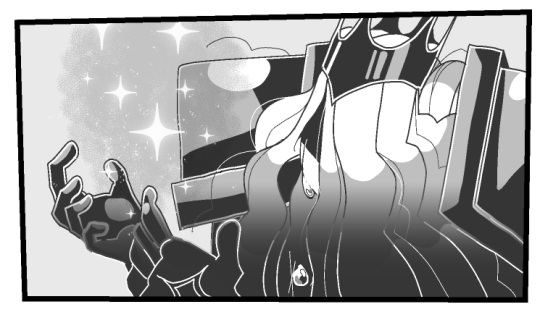
The Island was redacted from the perception of outside world, via Wish Craft.
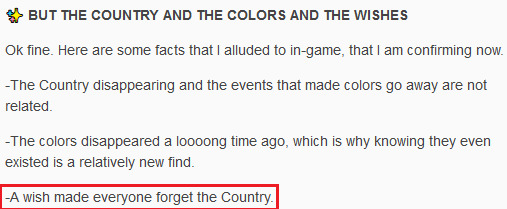
Wish Craft has the power to enable Time Craft. We see this primarily through Siffrin's timeloops, but also through the King's powers.

One of the King's powers is to show the saviors a "vision of the future."
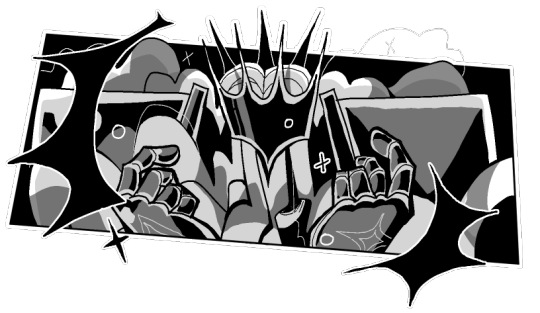
...And this same attack is deflected back at the King by Mirabelle in ACT 5, in which the King is able to see the Island before being frozen in time.
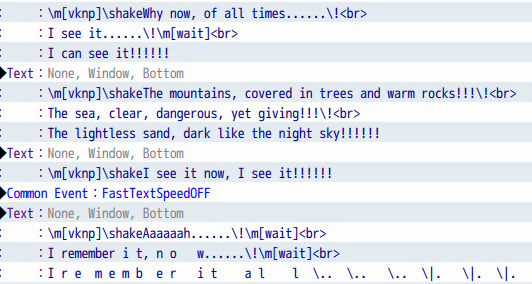
...So. The King's "vision of the future." We're never told explicitly what this vision is. All we know is that it's apparently powerful enough to wipe the party in one hit, hearing it from a distance hurts your head, and that whatever Siffrin (and Loop) saw, they don't seem to actually be able to describe it. Even the King himself doesn't know what his vision entails.


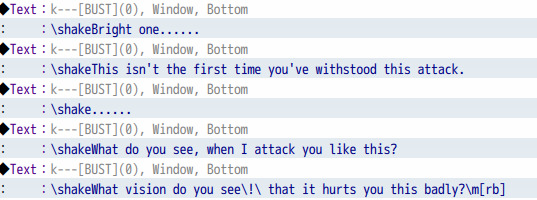
We don't know whether the party all sees the same thing when struck by the vision, and Adrienne's answer to the question about it in the Reddit AMA is. vague? It's not a "no," and the specific wording makes me think the answer might be yes. But that's me reading into it.

Now. What do we know about the Island's redaction? The Island was affected by the wish recently, as in "like a decade ago" recently. We know that nobody in Vaugarde or the rest of the world is capable of thinking about the Island, anything closely tied to the Island's culture, or people on the Island for very long. When they do recall these things, they slip right out of reach. Particularly, the consequence for trying to think about the Island (or, more specifically, break the wish that forces the Island out of perception) is significant pain, localized in the head.
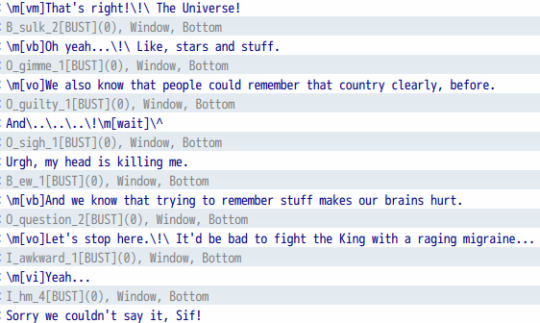
And that said pain is enough to become lethal, if pressed hard enough.
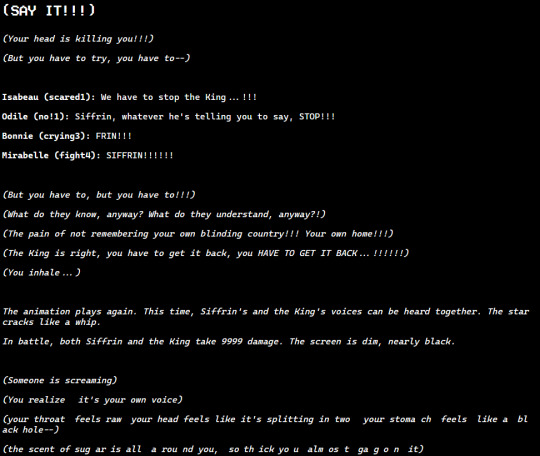
From here forward I'm running with the assumption that the King's "vision of the future" is not personalized to any individual, and is unchanging throughout the course of the whole story. Now. Remember the end of ACT 5, where the King gets hit with the deflected "vision of the future", and instead of dying, he recalls the Island and gets frozen in time? Very odd, yeah? Why wouldn't the King just die like everyone else does? He even does take 9999 damage when trying to say its name, like Siffrin does, and like the party does when they're hit by the attack.
Well. We know that he has a "true wish" that the ability to freeze Vaugarde in time grants. I don't think it's at all a stretch to guess that the King's "true wish" is to be able to remember the Island. My personal guess is that the King (and Siffrin) brought this "true wish" into effect via the "SAY ITS NAME" sequence- he even tries three times, a significant number in wishing.
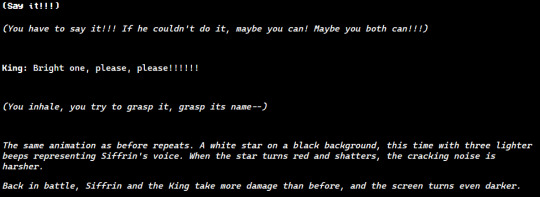


The King (and Siffrin's) wish breaks, because it can't be fulfilled in this moment without breaking the wish to prevent the Island from being thought about. However. Consider the conditions at the end of ACT 5- the King sees the vision of the future reflected back to him, and what he sees is the Island. He remembers the Island, fulfilling his own wish, and is frozen in time. I consider this a compromise between his wish and the one binding the Island- the King gets to remember the Island, but nobody alive is able to think about it, because he's frozen in time; it's like the Universe is correcting itself (I WILL GET BACK TO THIS). The wish of all of Vaugarde to defeat the King is fulfilled, since he is no longer a threat, and Siffrin's wish wraps itself up soon after.
MY POINT BEING. The King's attack is a vision of the future. This "future" is of the Island, in some uncorrupted state. The saviors see it when he attacks them, and he sees it when it is deflected back to him.
The logical next question is "okay, so the Island exists in the future, but how do you know time shenanigans are even related to the Island?"
Recall a very odd series of interactions throughout the game, in which you try to interact with a piece of equipment that you already own.
The game rewinds slightly, before the item disappears, as the Universe corrects itself.

This is awfully similar to two particular events: looping back without seeing the death screen, and talking to the Daydreaming One about her sister. The latter is more interesting to me for the purposes of this theory.
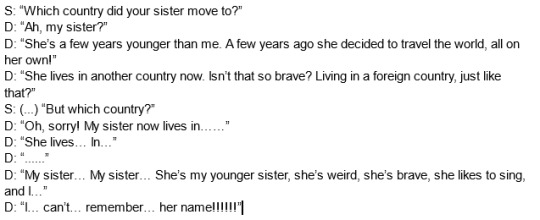
youtube
In both instances, something is misaligned within the Universe (an item existing in two places, someone remembering something they're not supposed to) and it is corrected through some sort of rewind. Also compare the dialogue above to when you try to give Mirabelle the Stylish Bow when you already own it.
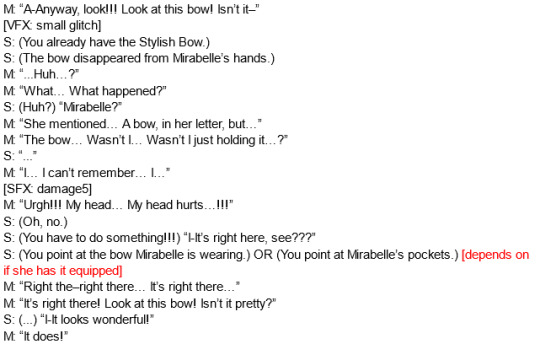
The world glitches, but Siffrin defuses the situation before the Universe has to intervene. Omitted from the screenshot is the fact that Mirabelle's portraits switch to happy from "catastrophically anxious" with no transition after Siffrin shows her where the bow is. Important to note is that when Mirabelle tries to recall receiving the bow, her head hurts, much like how trying to break the Island wish causes a headache.

The Universe leads you away from perception, and you can only follow.
My theory that I keep circling around is that through Wish Craft, the Island has been displaced temporally. The denizens of the Island, as well as the Island itself, still exist, but they are in the future. The Island is still loaded into the world, like how equipment is before you try to interact with it, and the Island cannot leave this quantum state, because it never actually went anywhere. The magnitude of the redaction event is so severe with the Island, because it is so much larger as an entity than a sword or a bow. There are of course things I don't really have pieced together, like why somebody would wish the Island into the future, how far into the future it is, or why equipment behaves this way. But it's the only Island theory I've seen that I have some level of confidence in, so I might as well lay out my cards for it.
#asks#this counts as an opinion right? idk#isat meta#isat theory#isat spoilers#isat#sorry i fucking love talking at people but im terrible at coming up with things without a hook so im just saying Any Words#also i cant have opinions without citing my sources.#i'm literally not even the first person to come up with this theory but it has been slowly eating away at my mind for months#and since that one person in isatcord who is smarter than me brought it up i havent really seen this theory in circulation#so i've been wanting to make a post compiling evidence for it for like. fucking forever#sorry to dunk you guys in images hell but like. I need you to See It. See my vision. of the futu- (is shot)#thank you feli as per always your website is so sexy andawesome and cool and it's the best forever.#(SORRY FOR THE YT EMBED BTW. TUMBLR HATES MEEEE)#this is not the most cohesive theory in the world via both my terrible explaining abilities as well as the holes i mentioned#but i think it's an interesting theory and i want to share it. sorry anon
630 notes
·
View notes
Text








Inspired by an old shitpost @courtney-deserved-better made, except i assigned them to roti characters instead!
#cheese posting#i love plagiarism except it's not plagiarism because i cited my sources and it's not really the same thing i guess#I made very specific formating choices with this see i seperated the bits in black and the bits in white-#because the bits in black are from like reddit or something and the bits in white are from tumblr#hence. why it's also characters from different teams. so sorry anne maria you were perfect for the kinkshaming fruit comment.#td cameron#td zoey#td mike#td jo#td b#td staci#td scott#td dakota#total drama#total drama textposts#cheese's assigned textposts
136 notes
·
View notes
Text
A lot of people think autism research is solely this vague grouping of evil non autistic people guessing at things from afar, but as much as that happens, I want to inform you with insider knowledge a lot of modern autism research is done by autistic people!
And a fun fact related to this: "autism" is a common special interest! As in, a lot of autistic people have autism itself as a special interest (esp women, perhaps bc they're likely to be late or self diagnosed). People with a special interest in autism are also more likely to get involved in autism research as participants, and thus there's a known overrepresention of it as a special interest in data
#that post of “how you can tell a study was designed by an autistic person” frustrates me bc. i know its not everywhere but its MUCH BETTER#tumblr just i think assumes we're still 20 years ago. i promise you a ton of academics working on autism are in fact autistic#and theres a good push for involving autistic people in general w design feedback data everything.#source: friend is cited on the autism wikipedia page <- extremely powerful statement deserving of autism crown#but more specifically just a top uni psychology department. i dont get academia much but ive heard a lot#yes theres stuff lke “is camel milk good for autistic people” (REAL STUDY) but like. the autism is coming from inside the lab#also the post annoys me bc good clarifying phrasing is key to ANY study regardless of anyone being autistic#“overrepp in data” is a funny phrase everyone matters but ppl w special interest in autism are just obvs more keen to. get involved w autis
132 notes
·
View notes
Text
Wait can I be crazy for a second. I'm rewatching Severance season one and it's actually crazyyyyyy that Mark was a professor of WWI history specifically because that war is when "shellshock" (which would become our modern understanding of "trauma") first got talked about ("From shell shock to PTSD..."), which directly ties into how we developed modern conceptions of the self, memory, and narrative acts of reintegration.
Fritz Breithaupt argues that our modern understanding of trauma was influenced by 1800s German romanticism. Just prior to this period in German literature, around 1770, the idea of "a sense of self" or "selfhood" was taking hold in the West. In German romanticism, trauma became a potential site for the development of that sense of self. Breithaupt argues that German romanticism began to take seriously "the acknowledgement that memory is subject to literary fictionalization" (Breithaupt, emphasis mine). German romantic novels began to acknowledge and play with the idea that our memories are imperfect and that retelling them may lead to new revelations about events in our past (Breithaupt).
Some of these German romantic novels began to deal specifically with "wounds." In these novels, "wounding events" initially shatter our sense of self, but they are also potent sites of potential transformation. Retellings and potentially even relivings of the wounds, in these stories, allowed for shifts in agency. For example, one might go from seeing themself as a passive victim in the initial wounding event to understanding, in the retelling, where they had agency even when they were wounded; this might then let them see where they have more agency in the present moment as well.
Obviously, our modern understanding of trauma has shifted a lot from our proto-conception of it in 1800s Germany. (For example, we now know that there are ways in which people who have been through trauma might seek to relive the trauma in a way that attempts to reclaim agency but actually further harms them) (Neimeyer). However, to this day, "narrative models" remain one form of therapeutic intervention offered for trauma. There are different forms of it, but the core of these interventions is often that certain forms of retelling the event can help reintegrate the traumatic event into a person's sense of self or life narrative and therefore lead to healthy growth (Levy).
So tying that back to Severance, we obviously see Severance playing with similar themes around questions of self, trauma, and memory. The severance process can be interpreted as inherently traumatic: it shatters a person's sense of self and robs them of their agency. It's the dehumanization demanded under a capitalist system, taken to an extreme. As the series continues, we also see explorations of further violations of innie's free will and bodily autonomy that can happen, such as Helena's rape-by-deception of Mark S. (which also uses Helly's body against her will) and the pretty literal torture Gemma is undergoing.
In Helly's case, this trauma was explicitly sexual, while Gemma's has undertones of sexual assault as well (as we see a man who clearly wants to exploit his power over her for some sort of "romantic" ends at least stripping her of bodily autonomy). In both these cases, they are left dealing with the physical and emotional aftermaths of events they can't remember, which is unfortunately an experience that many people who have been through sexual assault and rape will resonate with. We also see narrative themes of child abuse running throughout the show--explicitly in the paralleling of Harmony's past as an exploited child laborer with Miss Huang's current position at Lumon, and implicitly in the way even the adult innies are treated like children by their unsevered supervisors who dismiss their autonomy and claim to know what's best for them.
And while Lumon would not necessarily admit that most of the above had happened to its employees or that the severance process itself is, in some ways, inherently traumatic, they do seem to be developing this technology to help people avoid not just traumatic but even just uncomfortable/painful parts of life. Severance is not just critiquing the dehumanization that capitalism asks of us in order for us to do our jobs; it's also critiquing the way it then tries to sell us products that can cut us off from parts of ourself and our experiences, that placate or numb pain. There's a danger in following too far the German romantic understanding of trauma as a potential site of creation for the self--in my view, trauma does not have inherent meaning or make us stronger, and thinking that it does could lead us down a path of excusing it or even finding it necessary for some people to endure. However, trauma is something many of us have experienced in one form or another, and--as narrative interventions for trauma can help us see--there is a way to integrate it into the larger meaning of our lives that ultimately lets us move forward more healthily than if we attempt to cut ourselves off forever from the part of ourselves that endured pain.
We haven't yet seen what successful reintegration looks like, yet, in the show (although I suspect we might, sometime in the next few episodes). I also suspect it won't come without a price. But I'm interested to see how Severance continues to develop its themes in conversation with the history of trauma. What stories do we tell ourselves about our own memories and our sense of self? Who else shapes or tries to shape these stories? What is the price of cutting off part of ourselves to try to live without pain? What is the price of living with pain to try to live with more wholeness? Which price would we rather pay? How do we continue to make meaning and build enduring relationships after that initial shattering of identity and our attempted repair? I think we'll start to see Severance's answers as this season comes to a close.
Works Cited
Breithaupt, Fritz. “The Invention of Trauma in German Romanticism.” Critical Inquiry, vol. 32, no. 1 (2005): 77–101. https://www.jstor.org/stable/10.1086/498005
"From shell-shock to PTSD, a century of invisible war trauma." PBS News, Nov 11, 2018. https://www.pbs.org/newshour/nation/from-shell-shock-to-ptsd-a-century-of-invisible-war-trauma.
Levy, Michael S. "A Helpful Way to Conceptualize and Understand Reenactments." The Journal of Psychotherapy Practice and Research, vol. 7 (1998): 227–235. https://pmc.ncbi.nlm.nih.gov/articles/PMC3330499/
Neimeyer, Robert A. “Fostering Posttraumatic Growth: A Narrative Elaboration.” Psychological Inquiry 15, no. 1 (2004): 53–59. http://www.jstor.org/stable/20447202.
#wheeeeeeee#severance#girls will write entire essays on severance instead of writing the actual grad school essays they are supposed to because#they are 'sick' and 'have a cold' and 'can't concentrate'#also sorry i think it's so funny putting a works cited in a tumblr post. and also i did want to give credit to my sources but i thought thi#was the funnest way possible not just putting in an x with a link
30 notes
·
View notes
Text
also I know I’m strolling in seven years late to Horizon’s representation problems but I feel like these games are an instructive example in how the liberal imagination understands “good representation.” the game seems to take a lot of care in demonstrating (what the developers understand to be) a fully post-racial society by way of universal racial integration - every society or ‘tribe’ or group of people you encounter is almost uniformly racially diverse. Being generous, I think this is an attempt to avoid any possible racist implications in the fanciful costumes and outfits that Horizon is known for; there is a lot of focus in representing the different people of Horizon’s world through what they wear. You can immediately tell an Oseram from a Carja, not by their racial makeup, but by their clothing. This means that, if you meet a particularly ‘savage people’ (a term characters in the game use semi-frequently) who wear ‘exotic clothing’ and face-paint, the diverse racial makeup of the group prevents (or is intended to prevent) a racist conclusion about that group.
Likewise, the game presents a world free from systemic homophobic prejudice - Aloy is notably gay, but also her asking people about their partners, or assuming other people around her are gay, generally passes without comment. Horizon is presenting a fully ‘integrated’ social world, one whose conflicts are not meant to map onto ‘modern-day’ racism and homophobia.
But the underlying logic and structure of racism and homophobia (and binaristic, oppositional gender) are left intact. Humanity in Horizon is still presented as fundamentally separate from nature, moving overtop of it, extracting what they need from it, but never part of it as such. And this construction of nature as separate from “man” is not problematised, “man” just gets universalised into “human,” and “human” gets universalised into a non-racial category. This is completely side-stepping the history of this construction of nature as a white supremacist, colonial, capitalist construction, an understanding of nature as something colonial Europe is meant to hold dominion over through the dehumanisation of non-white, non-European people, converting them into non-human labourers and pests who live atop the land Europe is attempting to colonise and enclose. “Nature” in the modern western understanding is a fundamentally racial concept; nature is a ‘scientific, rational, biological’ container meant to house everything non-human about the world, an object to be studied and exploited by the one true subject of history, Mankind - and who is considered part of mankind is a question of whether you belong to the white European ruling class.
I think Aloy in particular represents this problem well - her access to and understanding of pre-apocalypse technology makes her universally suspicious and dismissive of any religious or ‘spiritual’ beliefs she encounters in other groups, frequently getting into reddit-atheist-adjacent quibbles with the ‘unenlightened,’ ‘primitive’ people of the world about the fact that the machines that harvest food for them and take care of the land are not gods, silly, they’re just machines! Her only real counterpart in terms of technological understanding is Sylens (a Black man), who is an antagonist. Like despite the game’s attempts at neutralising race as a coherent category, it is kind of unavoidable to notice that the protagonist is a white woman who’s only equal is a Black man engaging in constant deception for his own benefit lol
And Aloy’s anti-religious sentiments are deeply funny, because the game’s narrative itself has a theological relationship to technology - humans destroyed the world with technology, yes, but salvation of humanity is only possible through technology, specifically a globe-spanning technological system meant to be an environmental steward to the planet, repairing the damage caused by previous technological catastrophes and human wars. Human beings themselves are insufficient to the task of taking care of the planet, and “nature” itself is incapable of self-governance or regulation. And the way this technological system is made to function properly again is, hilariously, unlocked through the genetic code of a white woman, a perfect clone of the technological system’s original creator. the solution to Horizon’s central conflict and threat is, ultimately, a white saviour
And so the appropriative elements of Horizon - calling the Nora ‘braves,’ the abstracting of hundreds of north american Indigenous cultures into mere aesthetics and symbols, the invocation of words like savage and primitive, and so on - are not surface-level problematic elements of an otherwise anti-racist game, they are indicative of a liberal anti-racist imaginary, a place where we’re all equal human beings whose main problem are vague sectarian grudges, without looking at or dealing with any of the underlying ideological frameworks that produced race or gender in the first place.
So I think Horizon is, despite attempts to imagine a post-racist world, nonetheless very limited in how it represents this post-racial world because it understands racism as prejudice against particular phenotypic characteristics, not an underlying logic that renders “nature” and “human” as fundamentally racial concepts in history
#um. idk what to tag this#also what’s the consensus on citing sources for tumblr posts. I’m using Quijano and Lugones’ work on coloniality of power & gender if you#want to read more about the colonial history of nature#I should probably just post excerpts of those works instead#horizon
207 notes
·
View notes
Text
Sbr is only mildly morally ambiguous and that’s okay
okay so the title is misleading 🫣 this is just a short examination of Johnny v Valentine (and Johnny & Valentine) with a little analysis of the confrontation.
for me valentine’s defining character trait isn’t his patriotism but that’s he’s a massive fucking liar. excellent writing for a politician. the only promise he ever kept was the one he made to lucy not to harm steven. and even then valentine is also super vindictive, so even though he didn’t kill him he made sure to torture him a little. Valentine is not at all the magnanimous man he presents himself to be and the constant discrepancy between his words and his actions proves that. when he’s trying to trick johnny into ending the rotation he hits all correct appeals but johnny knows in his gut that this man is a liar.
sometimes ppl act like sbr proposes a huge moral quandary about valentine’s intentions and whether he was the one “walking the righteous path” all along. but there’s really not. that’s Johnny’s internal battle. Since nick’s death johnny believed himself to be a curse / burden / bad person, but through the race he undergoes several trials that end in self-improvement and learning to have grace with himself. by the end of the narrative Johnny has evolved into someone who does have the strength of character and integrity necessary to judge the actions of someone else, whether he believes it or not, and regardless of whether he feels the right to. So yes, johnny was right to kill valentine. there’s no ifs or buts about it. the true brutality and cruelty of Valentine’s ideal world was very clearly portrayed in the way D4C Love Train functions. the corpse appeared to ‘choose’ Valentine by granting him Love Train, but at the same time it was also healing Johnny. if we look at the corpse through the lens of it primarily being a tool used to achieve the collector’s desires, we see that it empowered both Valentine and Johnny and indirectly or not set them on a collision course with each other. Perhaps there was a question of who was ‘righteous’ for the corpse itself, but the narrative itself tells us over and over again that it’s Johnny.
look at it this way. Johnny, who for most of his life believed he was spiritually and later physically damaged beyond hope, was empowered through the corpse and ended the narrative with a new chance at life. Valentine, who desired a world where not just America would prosper, but where he would be the head of said prospering state, and embody the power behind it, was granted the ability to achieve that world. Yet during their confrontation, the callous cruelty and negative consequences of Valentine’s vision is made apparent over and over again. First with Lucy, then with the innocents killed ‘somewhere else’, and lastly with Gyro and Johnny. Valentine’s actions always betray the truth of his intentions; once he proposed the deal, should Johnny have accepted, he intended to backstab Johnny and kill him the moment he got what he wanted. If he had truly been the ‘righteous one’, he would have kept his word and left Johnny alone once the rotation was reversed. But leaving Johnny alive would have meant he was no longer the most powerful man in the room, and that idea is something Valentine can’t stand.
Valentine is not a good person with good intentions. He claims to care about America, yet throughout the story discards his men and citizens like bugs (consider the train engineer). His actions continually demonstrate the reality: Valentine is power-hungry, petty, vindictive, ruthless, and above all else, a manipulative liar.
Valentine’s patriotism is the motivation behind his actions, but his brutality and deceptiveness defines those actions and is evident in everything he does. The implicit reason Alt!Diego failed was because he believed Valentine. By the end of the story there shouldn’t be a question on whether Valentine or Johnny was in the right. Valentine was the villain and he needed to be defeated. His ‘righteous’ world was, unequivocally, wrong.
#Funny valentine#johnny joestar#d4c#d4c arc#steel ball run#sbr#this isn’t as thought out as my usual stuff but I’ve been poking at it so I tried to write it down#This is my call to action. STOP SLANDERING JOHNNY. I am tired of ppl villainizing him to try and ‘add depth’ or whatever to sbr.#yeah there’s a *some* moral complexity but be so serious. youre telling me you don’t know who’s in the right??#Between reincarnated Jonathan Joestar and the American president who tried to sa someone? get real#I’ve been in this fandom long enough to have grown sick of the cold takes lmfao. maybe read and think about the story a little. just an ide#sbr analysis#My posts#sorry no sources cited this time. writing this on tumblr website on my phone bc it refuses to update and the app won’t function anymore.#hope everyone is having a happy holiday tho#this was all actually an elaborate lead in for a joke but um I thought about it and was like ‘wait I actually do have opinions about this’#sorry for the clickbait I couldn’t think of a good title
30 notes
·
View notes
Note
What did the UK have to do with the Rwandan genocide? AFAIK it was under German control, then handed over to Belgium after WWI, and then wound up as part of the French sphere of influence post-independence. I can imagine the UK was involved in the broader geopolitical decisionmaking around it, since it was the leading imperial power for much of that time, but was there something obvious I'm missing?
You know what, you're totally right--I mashed up Rwanda in my head with Idi Amin's regime in Uganda, which was down to the British Empire. Consequences of talking off the dome! Rwanda was, as you point out, a German and then Belgian job, with more of the formalization of the racism and divides between Hutu and Tutsi people happening under Belgian direct rule and the formation of that division under the earlier German aegis.
Sigh. Let that be a lesson to everyone that brain farts happen to us all, which is why you should always cross-check anything that matters no matter how much you trust the source.
#history#brain shit#neurodivergence#this is why *anything* I'm writing formally gets checked with a direct look at whatever I'm citing before getting released into the wild#tumblr on the other hand is me with my hair down which means sometimes I do make mistakes#which reminds me I have to finish up that other draft responding to the request for sources on another post...
28 notes
·
View notes
Text
Guys, I am so serious: I see you reposting my gifs, artwork, or creations OR someone else’s gifs, artwork, or creations, and I will block you immediately! I operate on a zero-tolerance theft policy.
#for anyone who is new around here or is rusty on Tumblr etiquette#stop doing this#reposting is theft#if you didn’t make it don’t post it#always reblog the original#ask for permission#cite your sources#gifmakers#gif makers#artists on tumblr#tumblr etiquette#i will never stop speaking up about it
80 notes
·
View notes
Text
Affixes, Clitics, and Particles
i think that these parts of language are really cool! so im going to try to explain them :D also i definitely did not get sent down an hours long rabbit hole of linguistic papers and i also definitely didn't find out that the reason i wanted to make this post is actually a misconception :D i love ignoring things :D
Affixes:
the wikipedia article for affixes says that "in linguistics, an affix is a morpheme that is attached to a word stem to form a new word or word form."
in hopefully simpler terms, this basically means that an affix is a letter, or a group of letters that form a single sound or syllable, that is attached to a word stem to form a new word or word form.
some examples of these are the somewhat well known prefix and suffix, but also the beloved infix:
prefix: undone suffix: spotless infix: abso-fucking-lutely
sidenote: my favorite thing about english infixes is that they pretty much only work with expletives. in fact, there's a tom scott video about expletive infixations!
Clitics:
wikipedia defines a clitic as such: "a clitic is a morpheme that has syntactic characteristics of a word, but depends phonologically on another word or phrase."
in layman's terms: a clitic is a letter, or a group of letters that form a single sound or syllable, that has the function of a word in a sentence, but depends on another word or phrase based on the sound rules of the language.
a few examples of clitics can be seen in finnish (which also has a great many affixes but we're not talking about those right now):
-ko/kö -han/hän -pa/pä -kin
the spelling of the clitic depends on vowel harmony. if you want to learn more, this dissertation is all about finnish clitics!
you may be asking yourself how to tell the difference between clitics and other parts of speech. well this study has just the thing for you! quite a few tests are suggested by the author of this study if you want to be able to tell if something is a clitic or not, including some of the following:
a phonological test observe how the clitic forms a phonological unit with an independent word. (do not ask me how this one works i dont know) accentual test "clitics are accentually dependent, while full words are accentually independent." put simply, if you can't put stress on it, it's probably a clitic syntactic test a word can stand on its own and be subject to normal word processes such as tense changes while a clitic cannot do this
Particles:
"'Particle' is a cover term for items that do not fit easily into syntactic and semantic generalizations about the language[.]"
read: "particle" is a miscellaneous, catch all term for anything that doesn't fit into the above two categories (or any other word categories like nouns, verbs, etc.)
the author of this study (who i'm going to refer to as Zwicky from now on because it's easier) says that theres no such thing as a particle and that its distinction from affixes, clitics, words, and clauses is unnecessary. i think thats an. interesting take.
anyway even though Zwicky just said theres no such thing as particles (which, how could he do that? theres kids around! we dont want to ruin the magic!) he concedes that there is actually a group of words that are commonly called particles that he agrees are actually particles. but he decides to call them discourse markers instead. because fuck you.
i dont like any of the words that Zwicky included so i made a list of my own:
-ね (ne) eh (canadian english) innit (common transcription of "isn't it", british english)
the funny thing is im coming out of this still not entirely clear on what a particle is. i thought i knew, i did some research, realized i didnt know, and now i'm here. based on how Zwicky puts it, it feels like the category of "particle" exists to accommodate the fact that there might be words* that arent affixes, clitics, words, or clauses but it feels like Zwicky is just being contrary. I should probably have done more research but this post was supposed to be done 24 hours ago.
out of context highlights from my research process: - sanskrit - the panini rule - doch - verbosely long section titles
*i dont actually mean words, i mean a morpheme which is a letter or a group of letters that form the representation of one sound that carries meaning, but i didn't want to make that sentence long and unreadable
if i'm wrong, please tell me! i would appreciate being corrected, i know i am not an expert on this topic in the slightest.
#i think this post is about to go off the rails.#which will be quite amusing for everyone except me#and then later me in the future [as well].#i think i'm finally done :D#citing is so much easier on tumblr 😔💕#i can just link the source on the words#i dont have to deal with a stupid bibliography#i really feel like with particles i have like net 0 information gained#but hopefully you learned something about clitics and affixes!!#i def learned about clitics because i only had very surface level knowledge before 🤔#i also dont understand any of the properties of particles given in the paper#i also felt very much like “are the properties of particles in the room with us right now”#like i dont think they were listed#granted i did skim the latter half because i was tired and just wanted to get this done#but still :p#also#a note from myself from about an hour in:#linguistics my beloved <3#linguistics
28 notes
·
View notes
Text
you guys know what wouldve been crazy
what if in the confession scene they had dean on his knees like he was in 8x17 Goodbye Stranger in the crypt… like what if.,, season 15 dean down on his old man knees * being told that cas cared about the whole world because of him..; what if instead of the handprint on his jacket * it was on his cheek to parallel how cas healed him in 8x17:,. are you guys listening can anyont hear me
* citation: see 12x23 All Along the Watchtower, 15x09 The Trap
* citation: see 4x01 Lazarus Rising, 4x10 Heaven and Hell, 15x18 Despair, 15x19 Inherit the Earth
#hello??? hello? anyone out there?#citing sources on a tumblr post jesus christ what have i come to#spn#supernatural#destiel#deancas#dean winchester#castiel#spnposting#nov 5th#remember remember the 5th of november#spn 15x18#spn 8x17#spn 12x23#spn 15x09#spn 4x01#spn 4x10#spn 15x19
41 notes
·
View notes
Text

have IG users ever had one (1) original thought in their life ever?
#i swear i read that exact text as a text post on tumblr like a year ago#sorry for the censorship but i ain’t giving away my IG#nothing much to see anyway#i literally use it just to see what popflex is up to#ANYWAY this guy is a total scam he uses other people’s original tweets/tumblr text posts and then sells merch about ‘his’ takes#that are not his#GROSS#oh and btw have i mentioned that they’ve also been stealing my calico critters memes without even citing who op is in the sources???#i occasionally repost things from IG but i always make sure to link who op was#these people are despicable to say the least
8 notes
·
View notes
Text
are you tired most of the time? is it hard to wake up in the mornings? is it hard to fall asleep at night? do you crave sweets and fats? are you getting depressed and anxious? is life stressful?
well, let me tell you about my scientific obsession of a few years: cortisol, which i assume, could be in the center of it all
cortisol is just your casual stress hormone, hanging around
but it has a wonderful daily pattern
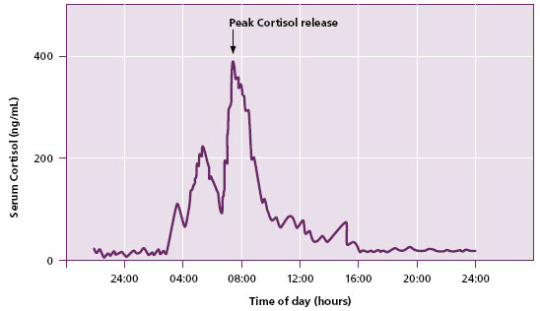
as you can see this guy goes from 1 to 400 during the night to peak at 8am (in this graph), but in reality peaks like 30 minutes after you wake up, depending on your sleeping pattern. it does not follow the clock everyone is supposed to follow, it follows YOU, it follows your internal clock.
so, let's put the first thing together - cortisol is a stress hormone, and the peak in the morning is supposed to wake you up. stress in this case is NOT a bad stress, but rather something to make your body flowing and being ready to face the day.
so, what happens when you do not sleep?

Source: Klumpers, U. M., Veltman, D. J., van Tol, M. J., Kloet, R. W., Boellaard, R., Lammertsma, A. A., & Hoogendijk, W. J. (2015). Neurophysiological effects of sleep deprivation in healthy adults, a pilot study. PloS one, 10(1), e0116906.
Image annotation from the source: Individual saliva cortisol curves (grey line) and cortisol mean value (nmol/L) per Tx sampling point (solid line). Day 1 shows baseline cortisol sampling at T1-T7, day 2 shows effects of one night of total sleep deprivation on cortisol levels at T8-T14. T1, 2 and 3 comprise the cortisol awakening response (CAR). T8, 9 and 10 are sampled at identical time points the following day. T5 and T12 are sampled at 14.00hr, T6 and T13 at 17.00hr and T7 and T14 at 23.00hr. p values show effects of TSD, # p = 0.016.
The pic above shows the same cortisol levels in day 1 (control) and day 2 (after not sleeping one night).
As you can see, there is no peak. It's just a flat line. This means, no sleep gives you no awakening response, and it also applies to less sleep. The less you sleep, the lesser the awakening the response, the more tired you may feel during the day.
And you might say "oh but it feels the same when i sleep 10 hours or 4 hours so what's the difference". That's because you've luckily got to wake up in a point where your sleep phase is the lighter. How do you feel thorough the whole day? And if it is still the same, regardless of sleeping hours, for how long have you been not sleeping enough? There is such a thing as sleep debt, and if you're in it, you won't feel any better until you get that debt off.
The no morning peak happens because cortisol is produced during REM sleep (rapid eye movement sleep or the phase known for dreaming, although you can dream in other phases too). REM sleep also has this thing, where the phase gets longer and longer the more you sleep. So if you sleep less, the REM phase total length is going to be less, so less cortisol for the morning peak. This is why bad sleep quality (like waking up every once and then and not being able to sleep for long uninterrupted periods of time) also can do the same thing. Sleep duration is one of the main players, but it's not the only one.
Anyway, back to the point. Less sleep, harder to wake up, logical, right, you didn't need a cortisol graph for that.
However, notice how in day 1 the 6 and 7 time points is pretty much a straight line, like cortisol just reached the minimal level at the 6th time point. If you look at day 2, at time points 13 and 14, the slope is bigger, right?
You might think that's ridiculous, there is such a tiny slope difference between last two points in day 1 and day 2, that it shouldn't matter
BUT IT DOES!
Cortisol production, like many other things in our body work by negative feedback mechanism. Which means, when there is a lot of it, the brains get the "guys there is a lot of cortisol we should stop". But with sleep deprivation, there is not a lot of cortisol, and the brains don't get that signal, therefore, in the evening, the levels are a bit higher than they should be.
And what does having a bit higher levels of stress hormone, the be awake and alert hormone means in the evening? Guess what? You won't be able to fall asleep so easily!
So, the first vicious cycle involving cortisol regarding the information above: the less you sleep, the less you will be able to sleep.
But that leads to another thing: stress! Cortisol, the stress hormone, obviously, leads to stress. And the more you stress, the more cortisol, the higher the evening levels of cortisol. Which messes up your sleep cycle even more.
So voila, the first vicious cycle, visualized:
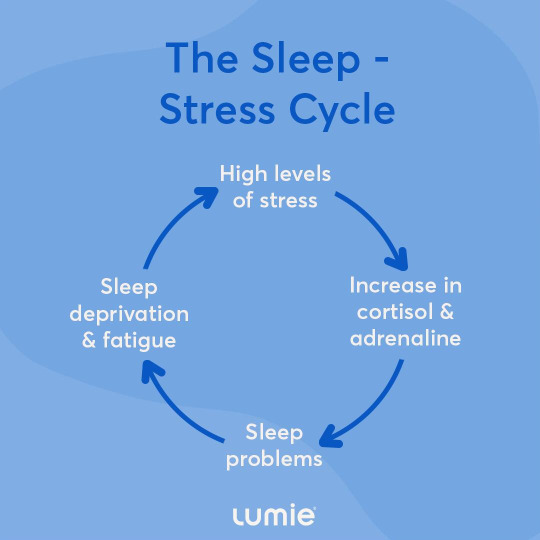
but it's not the end of it! oh boy it is not!
what comes with stress? eating problems!
how elevated cortisol in the evening plays a role in this? well, cortisol belongs to the glucocorticoid group. gluco sounds familiar, right, something to do with glucose right?
it makes more glucose available to the brain (which explains why it starts it peak during sleeping hours - while asleep we do not eat, but our brains are doing their thing, and thus cortisol skyrockets).
not only in the brain, but mostly everywhere, cortisol increases the glucose availability for tissues.
so cortisol makes the sugar be in your blood, but how else, besides the metabolism, can it make you get the sugar? by eating sweets of course! so you crave sugary foods!
you know what also promotes glucose in the blood? NOT insulin! so what cortisol does? blocks the thing. you know what insulin resistance and elevated glucose can do to a guy? make the guy diabetic!
also remember you are stressed, sleepy, crave sweets in elevated cortisol event, so you are less likely to have motivation for anything, including sports, so you are less likely to move, and more likely to gain some weight. and oh, how that makes it even more stressful, so voila, you add fuel to the vicious cycle
visualization here:
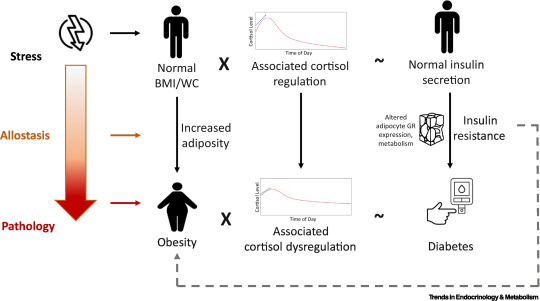
of course, there are other things involved, and the grand conclusion could be this:
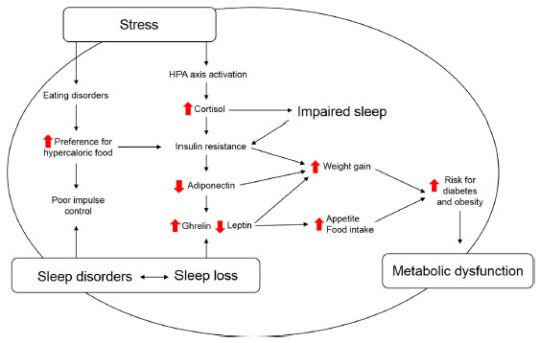
Source: Hirotsu, C., Tufik, S., & Andersen, M. L. (2015). Interactions between sleep, stress, and metabolism: From physiological to pathological conditions. Sleep Science, 8(3), 143-152.
what can you do to get out of the cycle?
idk honestly. i'd suggest eating breakfast, because cortisol also spikes after meals (idk exactly why) and it can boost your morning cortisol levels to make the slope more pronounced (thus making the evening levels lower)
but most importantly - move. do something physical. there are mechanisms involved, trust me, i just don't want to write another post about them, but it actually helps. it doesn't mean you have to go to the gym and join a sports team, it could mean just taking long walks, maybe search some beginner yoga or whatever. just move around.
here is a pic of individual factors that play a role in this:

and while you can't really change your genetics, disorders, mental distress and most medication use, you can work on unhealthy lifestyle and intoxications
Source of the pic: Van der Valk, E. S., Savas, M., & van Rossum, E. F. (2018). Stress and obesity: are there more susceptible individuals?. Current obesity reports, 7, 193-203.
Image annotation from the source: Conceptual model of the interplay between the stress system and obesity. Various individual characteristics are proposed to play a role in initiating a vicious circle of increased activation of the stress system (both by perceived chronic stress as well as increased net glucocorticoid effect by either endogenous or exogenous GCs) and obesity in a bidirectional manner. Abbreviations: GC, glucocorticoid; SNP, single nucleotide polymorphism; OSA, obstructive sleep apnea
if you read this all i am open to marriage proposals, thank you
#long post#im sorry i did not feel like doing uni things and i got tried of academic writing#so im resorting to yelling on tumblr about. well. my academic passion lol#without proper citing and formating#and its icking me because i said so many things without sources this like academic crime#but like. i know these things. i researched them. im still researching them#cortisol
33 notes
·
View notes
Text
hmm i may have kneecapped my last post by adding a bunch of shop links.
#original post#i’m not sponsored i just like citing my sources :(#idk if tumblr gets mad at me if i add a bunch of links i can’t tell if my post shows up in tags or not
5 notes
·
View notes
Text
Literally insane to me how much technology was developed in Asia before it reached Europe in history. Stuff like printing, paper, guns, etc.. It's really kinda crazy to think about
#was gonna go on a whole tangent about how its interesting that we see europe as technologically advanced for reasons like weaponry (ex Jared#Diamond's very good guns germs and steel) and how interesting it is considering a lot of technology was a latecomer to Europe and how this#is a result of later historical events like spheres of influence surrounding China#but then I decided that's too complicated to talk about in a tumblr post where I don't want to cite sources#or reread said's orientalism#bern speaks#history
12 notes
·
View notes
Note
i don’t know if you have seen the TOS movies so i will try to be as vague about this as possible so to not spoil them for you. i think a large portion (or at least a portion) of the issues presented in TOS are because starfleet sucks, to put it in the best words. this is not including the issues and harm it has done on real people, im talking about the in-universe starfleet and how it presents itself and its rules (example: colonization (encouraging its captains to colonize, encouraging its captains to make other planets and civilizations join their “american” federation)). a larger and more prominent explanation is how its, as described in VI, a “homosapiens-only club”. the klingon who says this also goes on to say that the federation is racist. and this is shown after both kirk and spock say they believe that the federation is peaceful. and obviously they think that because that’s what it presents itself as to it’s employees. another example is in TSFS when a higher authority from the federation tells kirk that he doesn’t believe in vulcan rituals, therefore, if kirk does this ritual, he will be fired. i know this is shown in the show as well but the more obvious examples are from the movies; to me it feels like they’re outright saying it in the films
i know this is not how it was intended to be perceived but this is what the show presents it as. i could be missing something or misunderstanding but this is how i see it, and from what i’ve heard, this is talked about in ds9
also starfleet coincidentally decides that the dark skinned aliens are enemies (this is more of a writing choice and the writers (and character designers) are at fault for this but it presents itself as an obvious issue, in universe, in V & VI)
I’ve seen the first four movies! My recall on canon and the intricacies of starfleet etc are not so precise, so I appreciate the context and some of that sounds familiar. I’m assuming you’re responding to my bitching about the politics of tos and how disconnected it is (in my view) with the fandom’s perception of tos as a progressive cultural text.
I think those examples are good highlights of a lot of the in-universe problems with Starfleet. To go a step further, I think even absent Starfleet’s racist or discriminatory history in-universe, the show itself (at least tos, I haven’t seen the others) operates on a colonial imaginary, by which I mean, its basic narrative premises and assumptions are colonial (and therefore racist) in character.
Like okay, the premise of tos is that the Enterprise, as an ambassador of Starfleet/the Federation, is seeking out new alien life to study. The Prime Directive prohibits the Enterprise crew from interfering with the development of any alien culture or people while they do this, so the research they collect needs to be done in an unobtrusive way. I think this is the first point at which people balk at the charge that tos is colonial - the Enterprise’s mission is premised on non-interference, and I think when people hear ‘colonial’ as a descriptor they (understandably, obviously) assume it is describing active conquest, genocide, and dispossession. Even setting aside all the times where Kirk does directly interfere with the “development” of a people or culture (usually because they’ve “stagnated” culturally, because a culture without conflict cannot evolve or “develop” beyond its current presumed capacity - he is pretty explicitly imposing his own values onto another culture in order to force them to change in a particular way), or the times when the Enterprise is actually looking to extract resources from a given planet or people, I’m not exactly making this claim, or rather, that’s not the only thing I’m describing when calling tos colonial.
Its presentation of scientific discovery and inquiry is anthropological - the “object” of analysis is alien/foreign culture, meaning that when the Enterprise crew comes into contact with a new being or person, this person is always read first and foremost through the level of (the Enterprise’s understanding of) culture. Their behaviour, beliefs, dress, way of speaking, appearance, and so on are always reflective of (and represent a microcosm of) their culture as a whole, and more importantly, that their racial or phenotypic characteristics define the boundaries of their culture, ie, culture is interpreted, navigated, and bound racially. Because of this, Kirk and Co are never really interacting with individuals, they are interacting with components of a (foreign, exotic, fundamentally different) culture. And when they interact with these cultures, they very frequently measure them using a universalized scale of development - they have an evolutionary view of culture, ie, that all cultures go from savage to rational, primitive to advanced, economically marginal to economically dominant (ie, to capitalism). And the metrics they are judging these cultures by are fundamentally Western ones, always emphasising to the audience that the final destination of all cultures (that are worthy of advancing beyond their current limited/“primitive” stages) is a culture identical to the Federation, a culture that can itself engage in this anthropological mission to catalogue all life as fitting within a universal set of practices and racial similarities they call “culture.”
This is a western, colonial understanding of culture - racially and spatially homogenous people comprise the organs of a social totality, ie, a society, which can then be analysed as an “object,” as a “phenomenon,” by the scientists in order to extract information from them to produce and advance state (ie Federation) knowledge. The Enterprise crew are allowed to be individuals, are allowed to be subjects with a capacity for reason, contradiction, emotion, compassion, and even moments of savagery or violence, without those things being assigned to their “race” or “culture” as a whole, but the people they interact with are only components of a whole which are “discovered” by the Enterprise as opportunities to expand and refine the Federation’s body of knowledge.
And on the flip side you have the Klingons, which you brought up - a “race” that is uniformly savage, backward, violent, and dangerous. In the episode Day of the Dove, where Klingons board the Enterprise along with an alien cloud that makes everyone very aggressive and racist (this show is insane lol), the Enterprise crew begins acting violent and racist, but the Klingons don’t change. They aren’t more violent than before (because they already were fundamentally violent and racist), and they don’t become less violent when the cloud eventually leaves (because they are never able to emerge from their violence and savagery as a social condition or external imposition - they simply are that way). Klingons are racially, behaviourally, psychologically, and culturally homogenous, universally violent and immune to reason, and their racial characteristics are both physical manifestations of this universal violence as well as the origin of it. The writers and creators of tos are consciously invoking the orientalist idea of the “Mongolian horde,” representing both the American fear of Soviet global takeover as well as blatantly racist fears about “asiatics” (a word used in the show, particularly in The Omega Glory where a fear of racialised communist takeover is made explicit) dominating the world.
This is colonial thinking! Like, fundamentally, at its core, this is colonial white supremacist thinking. Now this is not the fault of tos as an individual show, this is a problem with western science in general, and I am not expecting a television show to navigate its way outside of this current colonial paradigm of scientific knowledge. I’m also not expecting an average person watching this to pick out all the intricacies of this and link it to the colonial history of Europe or the colonial history of western science. But this base premise of Star Trek is why the show is fundamentally colonial - even if the crew never intervened in any alien conflict, never extracted any material resources from other people, and even if the Federation did not have all these explicitly racist practices that you outlined, this would still be colonial logic and colonial thinking. The show has a fundamentally colonial imagination when it comes to exploration, discovery, and culture.
And so my problem, which is maybe where I need to adjust expectations for tumblr fandom, is when people call this show socialist or durably progressive in any way. This is not because socialist societies can’t be colonial or can’t be racist, obviously they can be those things, but because people are bundling “post-racist, post-bigotry, post-discrimination” in their labelling of tos as “socialist media.” When I hear someone call a piece of media socialist I am also bringing my own assumptions into those things, ie, I am expecting this claim to be actually reflective of the politics within the show to some degree. There can of course be debates about the exact nature and quality of those socialistic politics (see conversations about the politics of Disco Elysium, a contemporary canonical example of actual “socialist art”), but I’m at least expecting there to by a whiff of them in there! And I don’t think tos stands up to basic scrutiny in this regard. I genuinely do not even buy that it’s progressive, for reasons I’ve outlined above. Again that’s a genre problem, I think all sci-fi has to contend with this, but tos is certainly not a progressive exception to the political norms of sci-fi as a genre.
And THIS IS OBVIOUSLY not me saying you can’t like tos or that you’re racist for doing so, I deeply enjoy the show on its own terms, and its politics (good and bad) are part of that enjoyment. I’m also someone who is in university & complicit in all of these colonial scientific assumptions and practices, I’m not positioning myself as morally superior in this discussion. But when people package their enjoyment of the show with their analysis of it as socialist, as progressive, I think that is pretty fucking stupid and leads to a lot of handwaving of its fundamentally racist narrative premises. Hence my bitching
#pulling from Edward Said’s Orientalism + Fanon’s Wretched of the Earth + Aníbal Quijano’s Coloniality of Power for these points btw#sorry I know I’m citing academic texts in a tumblr post about tv show but those are largely the sources of my opinions#oh as well as Césaire’s Discourse on Colonialism. everyone needs to read that#tos.txt#anyway if this wasn’t what you were responding to then sorry lol
39 notes
·
View notes
Note
You are chronically online
You are also tumblr famous
Like everyone knows you
Why
woag..... you're like. the third person to tell me i'm tumblr famous. i'm starting to believe you guys
#anon i don't know why either#finn says shit#finn answers asks#finn talks to anons#need you guys to cite your sources#like#i feel like unless they have a bunch of notes on their original posts then deeming someone as tumblr famous is just based off of like. vibe#like my point is. how are we deciding this. what do you mean when you say everyone knows me#who is “everyone”
8 notes
·
View notes